Key takeaways:
- Follow-ups in dentistry enhance patient care by fostering relationships, providing valuable feedback, and preventing health issues from escalating.
- Consistent communication through follow-ups reinforces patient commitment to oral health and fosters loyalty and trust.
- Personalization and timeliness in follow-ups create lasting impressions and significantly improve patient experiences and satisfaction.
- Effective follow-up conversations can clarify patients’ concerns, provide emotional support, and empower them in their dental health journey.
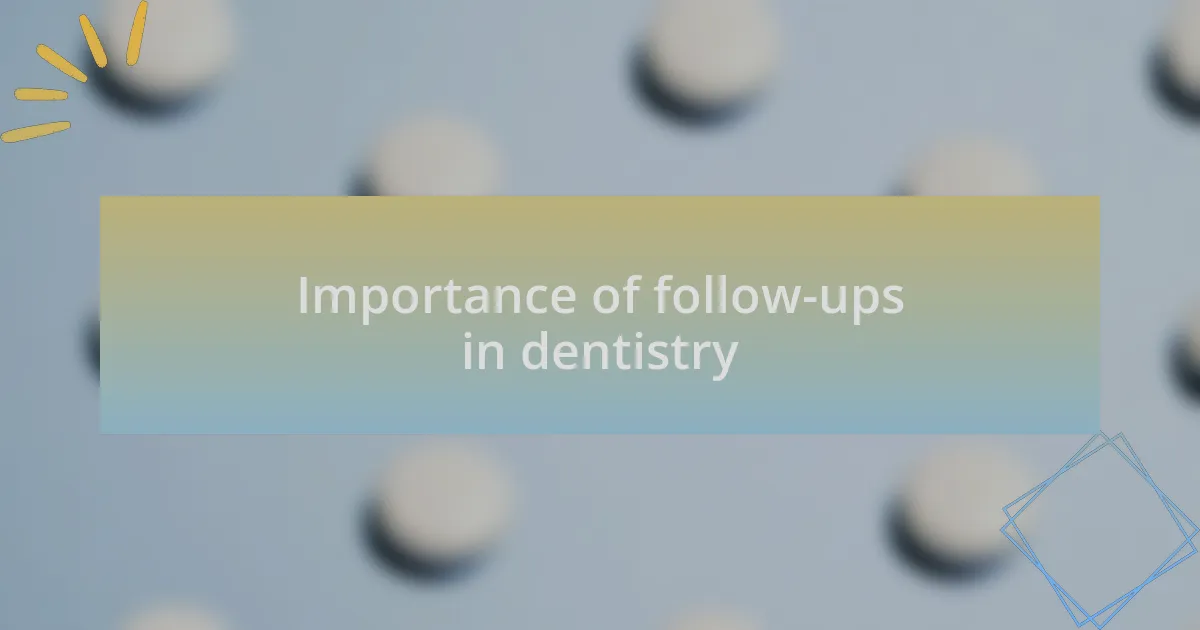
Importance of follow-ups in dentistry
Follow-ups in dentistry play a crucial role in patient care, as they ensure we don’t just treat issues but also foster lasting relationships. I remember a patient who was hesitant about their treatment plan, but after a follow-up call, they expressed gratitude for the gentle reminder and felt more reassured about the process. Isn’t it interesting how a simple call can bridge that gap between anxiety and understanding?
Moreover, follow-ups provide me with valuable feedback on how patients are managing their recovery. Several times, I’ve learned about unexpected challenges they faced after a procedure, which helped me adjust future treatments. How often do we overlook the importance of this ongoing communication in patient outcomes? It’s not just about the initial visit; it’s about supporting them through their entire journey.
Lastly, consistent follow-ups help maintain oral health and prevent issues before they escalate. I recall a specific instance where a follow-up led to early detection of cavities that a patient hadn’t noticed. This not only saved them discomfort but also reinforced the idea that their health is a priority to us. Isn’t it reassuring to think that such simple actions can have significant impacts on patient well-being?
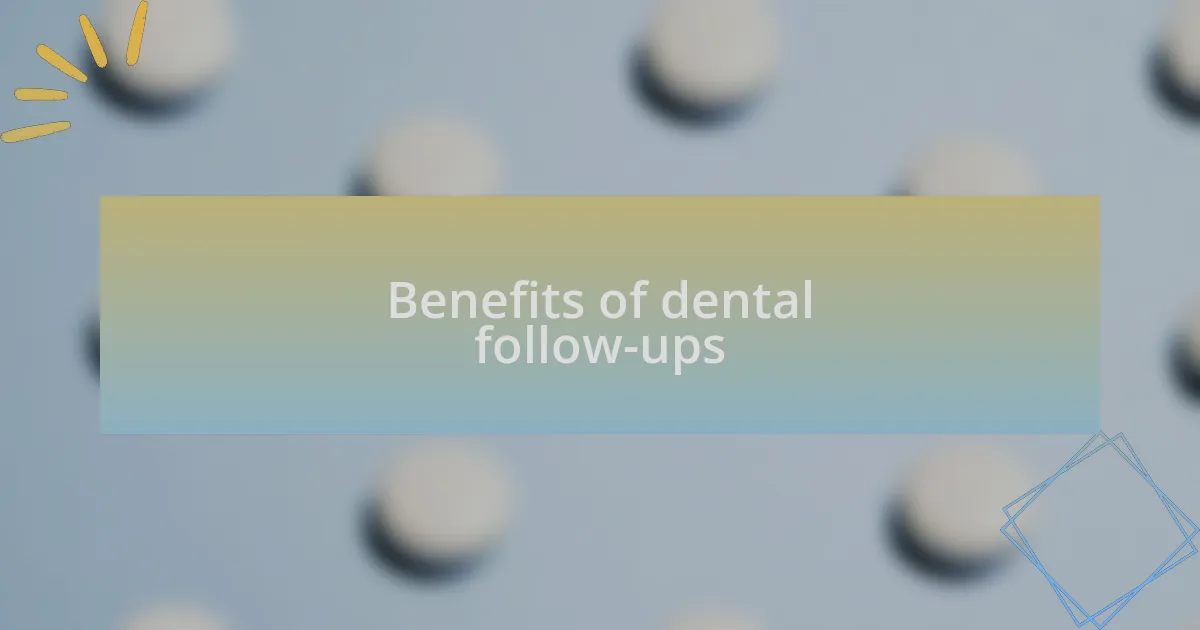
Benefits of dental follow-ups
Follow-ups are instrumental in reinforcing a patient’s commitment to their oral health. I once had a patient who, after a thorough cleaning, seemed ready to slack off on their dental hygiene. A simple follow-up email nudged them back on track; they shared how it reminded them of their goals. It’s remarkable how that little act can reignite their motivation!
Additionally, follow-ups often reveal invaluable insights into a patient’s experience with pain management. I remember checking in with a patient who had undergone a root canal. They shared they were still feeling some discomfort, which led me to revisit the aftercare instructions with them. This not only improved their recovery, but it also helped me refine my approach for future patients. Have you ever thought about how valuable that feedback can be?
Finally, consistent follow-ups foster patient loyalty and trust. One visit, I followed up with a long-time patient who had moved away. To my surprise, they mentioned they were still thinking about their dental care as a priority, thanks to a simple call from our office. It’s those moments that reinforce the idea that building relationships is as vital as any dental procedure. Don’t you think it’s these connections that truly enhance the patient experience?
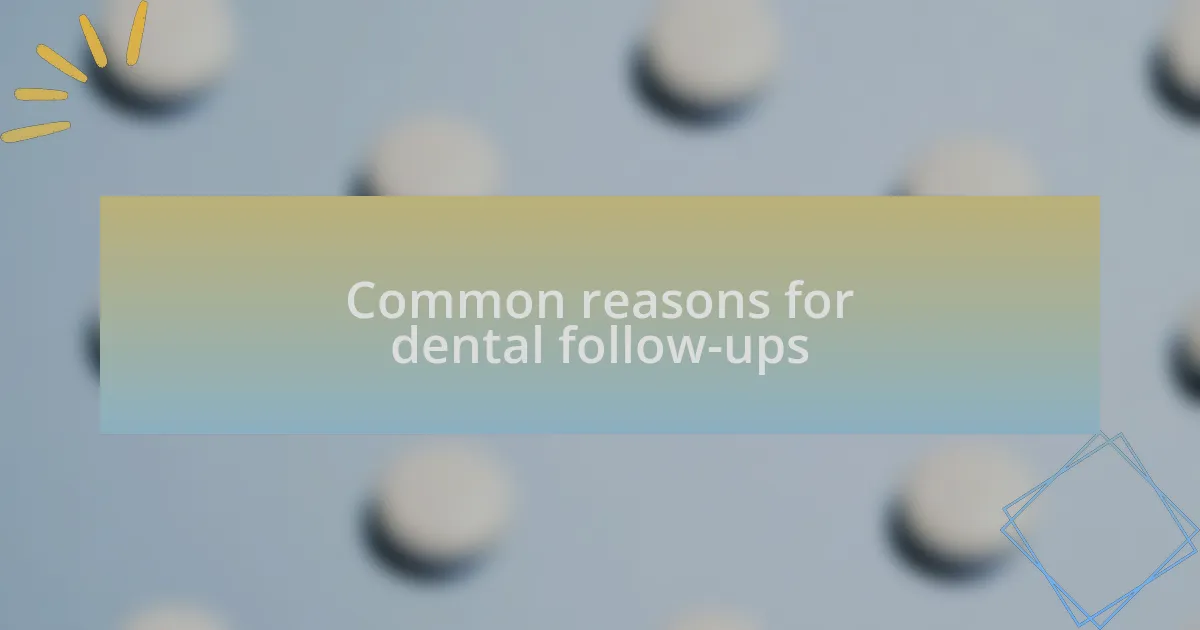
Common reasons for dental follow-ups
Following up after dental procedures is crucial for addressing any lingering concerns. I recall a time when I reached out to a patient who had just undergone a dental implant procedure. They mentioned feeling anxious about the healing process, which prompted me to clarify some aspects. By simply taking that time for a conversation, I helped ease their worries and strengthen their confidence in the healing journey. Isn’t it amazing how sometimes, a quick chat can make a world of difference?
Another common reason for follow-ups is to ensure patients are adhering to their treatment plans. I once had a patient who was given a personalized care plan post-orthodontics. When I followed up, they revealed they hadn’t been wearing their retainer regularly. It was then I realized the importance of not just the initial instructions but also the reminders to keep them on track. How often do we need those little nudges in our own lives?
Finally, follow-ups provide an opportunity to assess long-term dental health goals. In one instance, a patient I contacted had expressed interest in teeth whitening. After discussing their goals during a follow-up, we were able to create a customized plan that made them feel excited about their smile transformation. I think it’s not just about maintaining dental health, but also about recognizing how our smiles are tied to our self-esteem. Don’t you find that a little encouragement can go a long way in inspiring positive change?
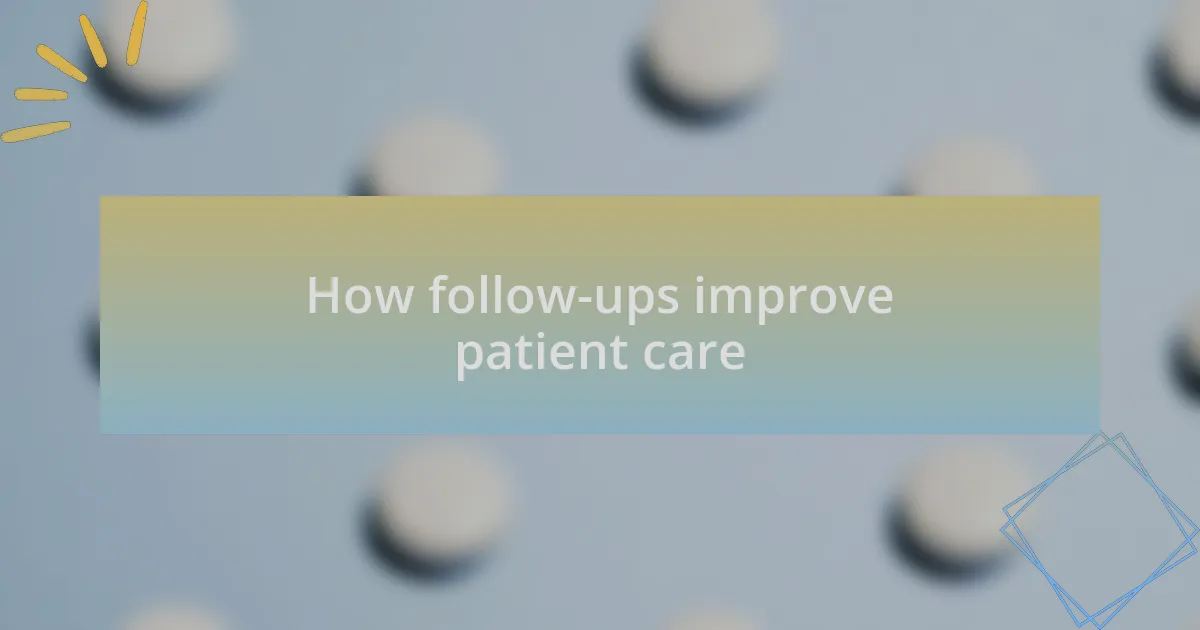
How follow-ups improve patient care
After a dental procedure, follow-ups create an essential connection that reassures patients about their recovery. I remember checking in with a patient who underwent a root canal; they were surprised by their discomfort. Through our conversation, I was able to explain that some swelling was normal and reassure them on the path to recovery. This small gesture fostered trust and comfort, ultimately enhancing their overall experience.
Follow-ups also serve as a reminder of the ongoing commitment to oral health. There was a time when I followed up with a patient who had neglected their biannual cleanings. During our discussion, they opened up about their busy schedule and how easy it was to let dental care slip. It reminded me how vital it is to provide support and understanding, because a simple reminder can reignite a patient’s dedication to their dental health journey.
Moreover, these interactions allow for ongoing education. I recently had a follow-up with a patient who was curious about the benefits of fluoride treatments after their filling. By diving deeper into their questions, I discovered their eagerness to learn more about preventive care. It’s intriguing how we often underestimate the power of knowledge; when patients are informed, they feel empowered to take charge of their dental health. Isn’t it powerful to witness that transformation?
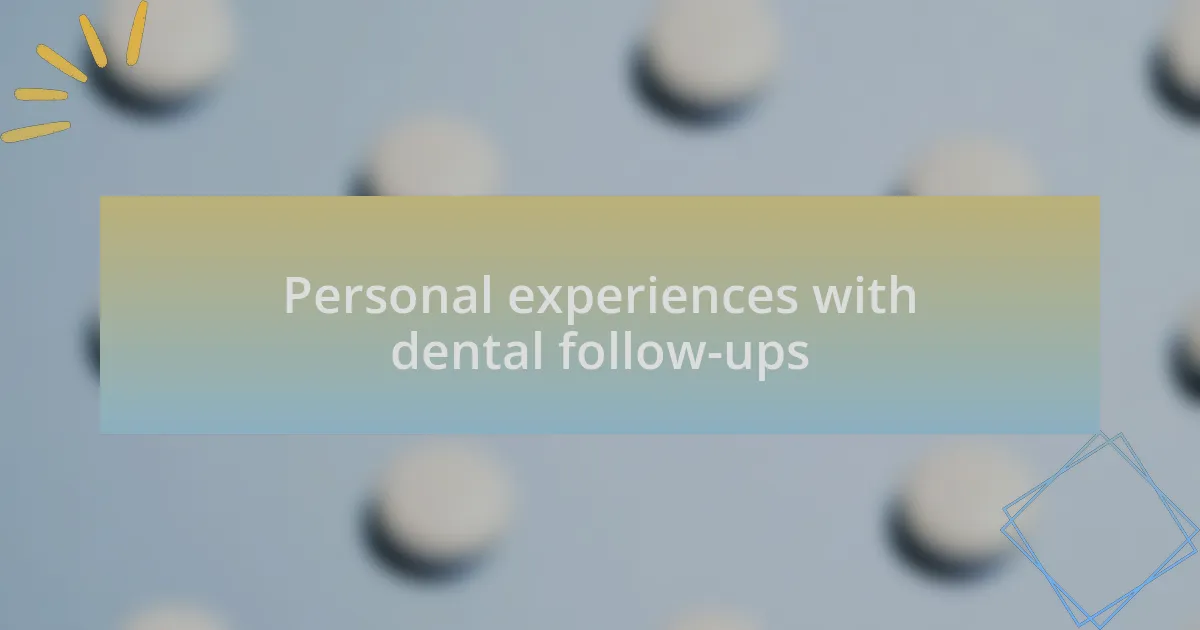
Personal experiences with dental follow-ups
Personal experiences with dental follow-ups can truly shape the patient-dentist relationship in profound ways. I remember following up with a young patient who was nervous about a wisdom tooth extraction. During our call, I could hear the worry in their voice, but as we talked, I shared my own nervousness from when I had my wisdom teeth removed. By relating my experience, it helped them feel understood and less anxious about their upcoming procedure.
One time, after a routine cleaning, I reached out to a long-time patient who had recently lost a family member. I didn’t expect them to open up about their grief, but they did. That conversation highlighted how dental follow-ups aren’t just about the teeth; they’re about the person behind the smile. It made me appreciate the importance of checking in on patients’ emotional and physical well-being, showing that we care beyond appointments.
Another memorable interaction was with a new patient who seemed overwhelmed by the process of care. After their initial visit, I followed up to see how they were feeling. They expressed frustration with the jargon and treatment options presented to them. It reminded me how crucial it is to communicate openly and ensure patients feel their concerns are valid. Isn’t it amazing how clarity can transform a patient’s experience from confusion into confidence?
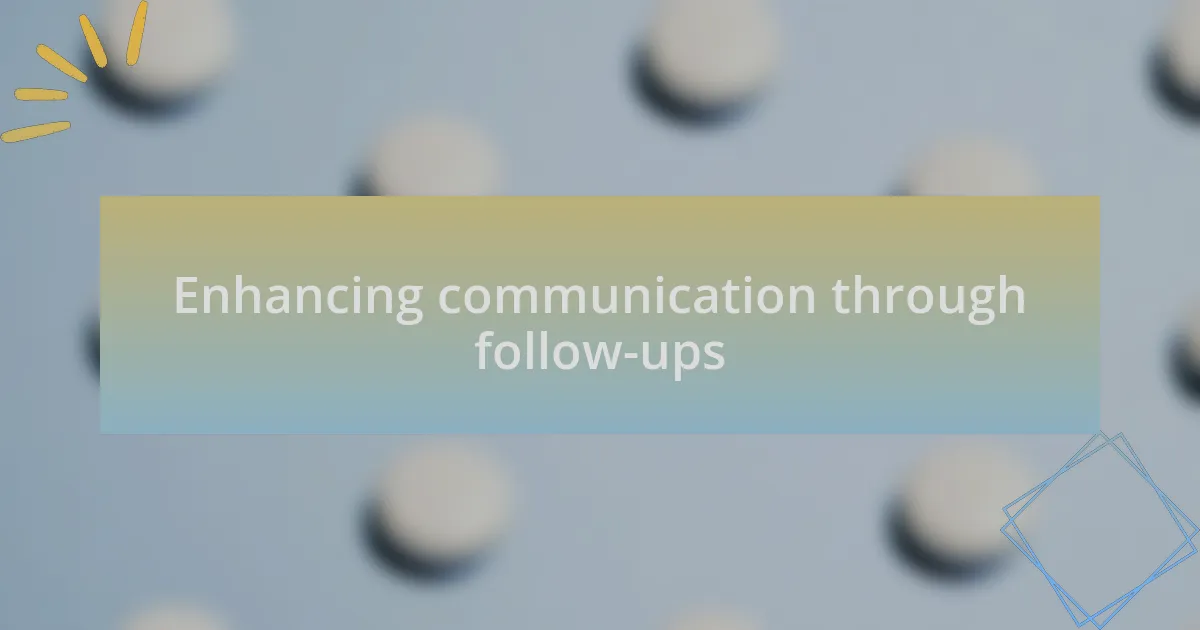
Enhancing communication through follow-ups
Enhancing communication through follow-ups is more than just a routine task; it’s an opportunity to deepen the connection with patients. I vividly recall a time when I followed up with an elderly patient who had undergone a dental procedure. During our conversation, she shared how the follow-up call made her feel valued and cared for, and it was rewarding to hear that my effort improved her recovery experience. Isn’t it incredible how a simple phone call can foster a sense of belonging and trust?
Another experience that stands out involved reaching out to a parent of a young child who had just received braces. The parent was grappling with questions about aftercare and dietary restrictions. I could sense their frustration over the complexity of it all. By following up, I could clarify their doubts and even provide them with tips I had learned over the years. I believe this kind of communication not only alleviates anxiety but also empowers patients to take charge of their oral health.
Lastly, my interaction with a patient who had been hesitant about their treatment plan truly emphasized the value of follow-ups. After checking in, I learned they had been grappling with their decision due to past dental experiences. Sharing my own journey of overcoming similar fears opened a dialogue that transformed their approach towards treatment. It just goes to show that through follow-ups, we not only enhance communication but also pave the way for healing and understanding.
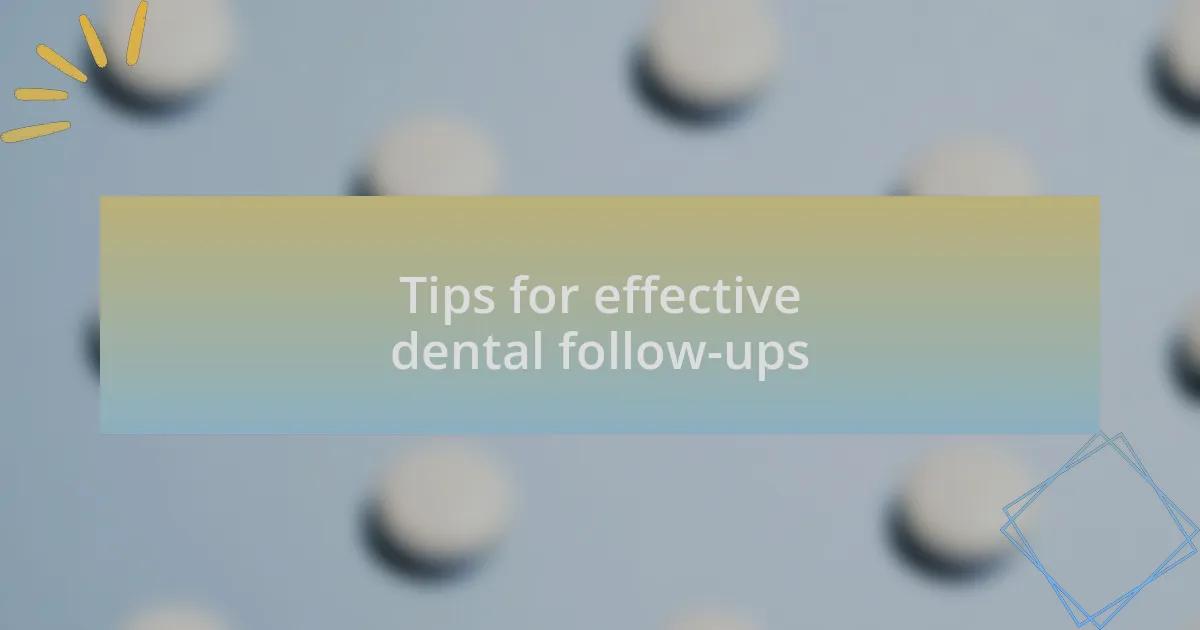
Tips for effective dental follow-ups
When it comes to effective dental follow-ups, personalization is key. I remember a particular instance where I sent a handwritten note to a patient who had recently completed a whitening treatment. The joy in her voice when she called to express how much she appreciated the personal touch made me realize that these small gestures create lasting impressions. Have you ever felt that someone’s effort to connect personally made a difference in your experience?
Being timely in your follow-ups can have a profound impact, too. I strive to reach out within 48 hours post-treatment, especially after more complex procedures. One day, I followed up with a patient who had just undergone a root canal. The speed of my call reassured them that their well-being was a priority for me. This quick response not only alleviated their immediate concerns but also built trust as they knew they could count on me to be there in the critical moments.
Lastly, I find that asking the right questions is essential in these follow-ups. During a check-in, I made a point to ask how my patient was feeling about their treatment journey rather than just focusing on the technical aspects. This approach opened the door for a heartfelt conversation where they felt comfortable sharing their challenges. Isn’t it amazing how asking thoughtful questions can lead to a deeper understanding of a patient’s experience and needs?